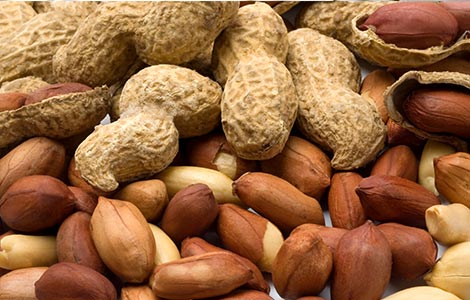
- Boron is essential for all plant growth. It is important for cell wall structure, root growth, and pollination.
- Peanuts requires an available supply of boron, especially during the pod development stage, or “hollow heart” may occur, possibly reducing quality and yields.
- One or more foliar sprays of Solubor® applied alone or with insecticides will help ensure an adequate supply of boron during flowering and pod development.
- Preplant soil application of Granubor® plus foliar sprays of Solubor during the season are recommended for soils testing low in available boron.
The nutrient requirements of peanuts are well known, and methods of fertilizer application and other cultural practices resulting in optimum production have been developed over the past 50 years.
Boron (B) has been universally recognized as the most important micronutrient for peanut production, but the boron requirement for peanuts is not as high as that for some other leguminous species.
While boron is essential for all stages of plant growth, an available supply is most important during flowering and pod development. This is especially true with today’s high-yielding varieties.
Cell wall strength, cell division, and fruit and seed development are plant functions related to boron. Improved nut quality has been reported with boron applications.
While boron requirements for optimum plant nutrition are low as compared with those of nitrogen, phosphorus, and potassium, the need for boron is especially significant in flowering and pod development.
Deficiency symptoms
Symptoms include internal fruit damage termed “hollow heart.” The cotyledons are concave and discolored. This damage reduces the quality and value of the crop. Yields and oil content of peanuts also may be reduced.
Severe deficiencies of boron which result in visual symptoms are rarely found in peanut producing regions where boron has been previously applied.
Soil tests and plant analyses
Boron deficiency is likely on coarse-textured soils where organic matter content is low, on recently limed soils, and where delayed maturity has been reported in peanuts with recommended nitrogen rates. Soil testing and plant analyses are both helpful in assessing the potential boron supplying capacity of the soil and the current boron status of the growing plant.
The critical level of hot-water-soluble boron for peanuts in most soils ranges from 0.2 to 0.5 ppm, depending on the soil pH, organic matter content and texture. Soils which are below the critical level generally will respond to applied boron.
The critical level of boron in upper mature peanut leaves is about 25 ppm. Peanut plants with leaf boron contents below the critical level should be sprayed one or more times with Solubor after flower initiation and during pod development.
Download PDF for charts
Recommendations for peanuts
Boron applications should be made every year for peanuts because soluble boron can be easily leached from the root zone, especially in sandy soils in high rainfall regions, or with over-irrigation.
The availability of boron in acid soils generally decreases when these soils are limed, so boron is recommended on freshly limed soils. Response to applied boron generally is greatest when there are adequate supplies of other nutrients, especially ntrogen.
Data below show increased peanut yields with soil and foliar applications of boron. Soil applications of boron increased peanut yields about 300 lbs/acre in Georgia. Internal damage in peanuts on low-boron soils in Oklahoma was significantly reduced by foliar applications of Solubor to supply 0.4 and 0.8 lbs of B/acre.
Download PDF for charts
Download Agronomy Notes